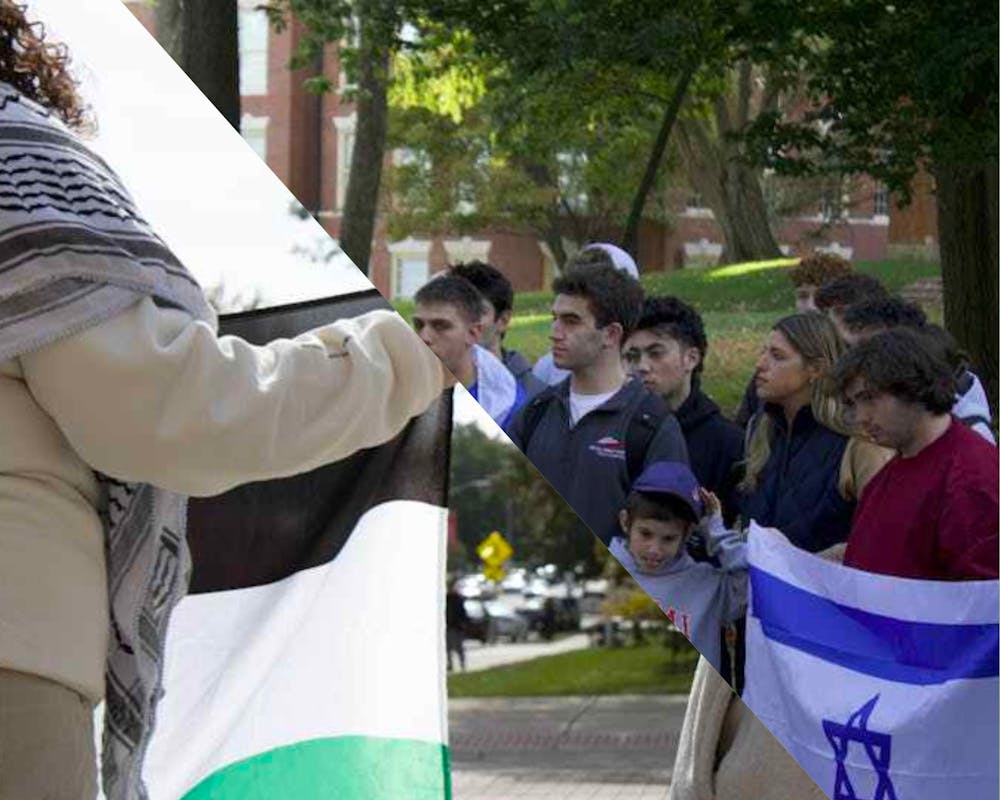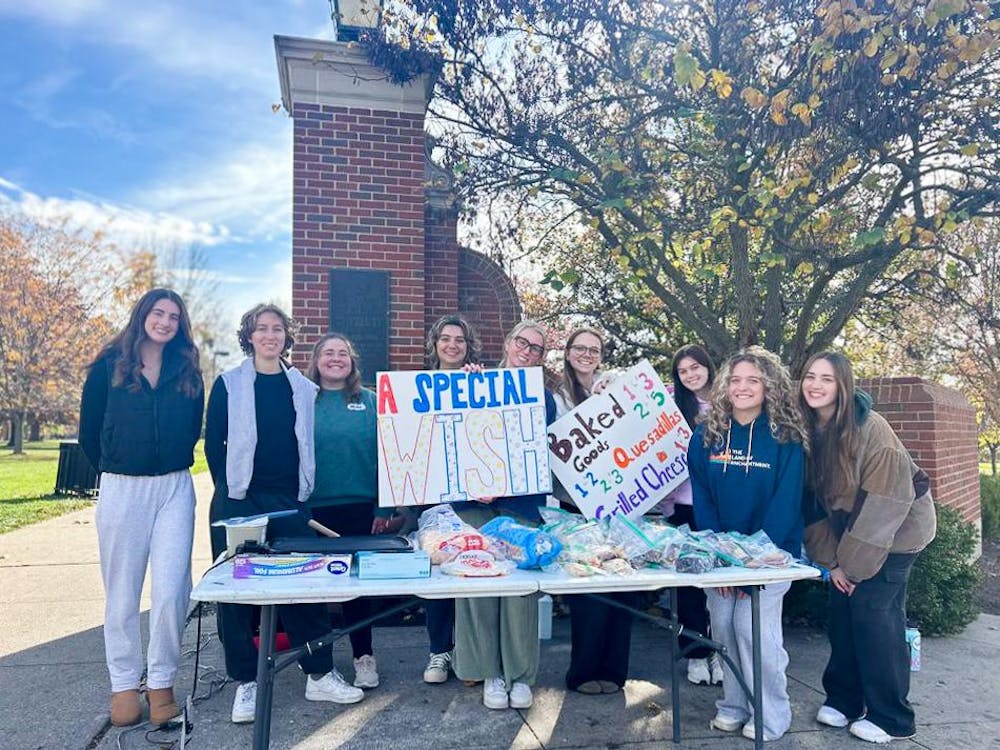On Saturday, Oct. 7, the Palestinian militant group Hamas fired a series of missiles and led a ground incursion into southern Israel, killing hundreds and taking roughly 200 civilians hostage.
The day after the Hamas attack, Israel declared war on Hamas, and two days later, according to the Associated Press, the Israeli government announced a blockade on the Gaza Strip — a 140 square mile area with 2.3 million people bordering Israel, Egypt and the Mediterranean Sea. The ban included the supply of food and water, as well as other necessary items for living.
According to the AP, more than 1,400 people in Israel have been killed while nearly 5,800 people in Palestine have been killed in Gaza. At least 96 Palestinian people in the Israeli-occupied West Bank have also been killed.
The events that took place on Oct. 7 was a continuation of 75 years of animosity between Israel and Palestine, the New York Times reports.
Up until 2005, Gaza was under the rule of the Palestinian Authority and partially occupied by Israel settlements and defense forces. During this time, the West Bank was also under the ruling of the Palestine Authority but was also undergoing occupation and annexation by settlers from the State of Israel and the Israeli army.
Two years later, Hamas claimed to be the democratically elected government of Gaza.
“When it made this claim to power, it immediately found itself in conflict, if not civil war, with the Palestinian Authority in the West Bank,” said Nathan French, an associate professor of comparative religion at Miami University.
French said since 2007 the residents have lived under a blockade instated by the Israeli government, and the continued treatment of Palestinians in Israeli-occupied territories has heightened tensions.
The blockade, put in place by the Israeli government, restricts medicines, food, construction materials and more coming in and out of Gaza. The Israeli government, parts of the Palestinian Authority and the Egyptian government argue that this blockade is necessary to prevent the growth of Hamas.
“Nobody condones what Hamas did,” said an unnamed SJP member. “I don’t think anybody condones that, but there’s context to it. Why did that happen? What are those people subjected to?”
They said they were not expecting to hear the news of the war breaking out on Oct. 7, despite being knowledgeable on the 75 years of history between Palestinian groups and Israel.
“How successful those extremist groups were in infiltrating into Israel was surprising to me because of how much we have heard about how state-of-the-art the [Israel Defense Forces] and Israel’s general defensive capabilities are,” the unnamed member said. “But then immediately, I was just filled with an incredible sadness, just overwhelming, because obviously it is so depressing.”
Enjoy what you're reading?
Signup for our newsletter
Shai Galili, a Jewish student and junior architecture major, was also astonished when he woke up to a text from his friend at 2 a.m. alerting him that Israel was striking back at Hamas.
“It was crazy,” Galili said. “I thought it was fake for some reason because no one expected this to happen.”
But he soon realized the reality of the situation.
Over the summer, Galili participated in Onward Israel, where he and other Jewish students at Miami spent 2 1/2 months in Tel Aviv being immersed in the culture, learning about Judaism and working through an internship program.
The students who went on the trip were instructed to download an app called Red Alert: Israel. According to the app description, it “provides real time alerts every time a terrorist fires rockets, mortars or missiles into the State of Israel.” On Oct. 7, Galili said the app crashed because of how many notifications it was pushing out. As of 4 p.m. on Oct. 24, Galili had already received more than 50 texts.
Galili’s dad’s side of the family lives in Israel. Galili himself is involved in Miami’s Chabad — a Jewish organization in Oxford that regularly celebrates Jewish traditions— and the historically Jewish fraternity Sigma Alpha Mu, had been to Israel countless times before living there last summer. In the past three weeks, two of his cousins and one of his friends have been called for reserve duty for the Israeli army.
“I think he probably thinks he’s going to get shot,” Galili said of his friend. “And he’s our age.”
He said as soon as he gets a notification of an attack near where his family lives, he immediately contacts them to make sure they’re OK.
One of Galili’s friends from high school is Palestinian. After Oct. 7, he reached out to his friend to understand how he was navigating the conflict.
“I just reached out saying, ‘Hey, I hope you’re doing all right. I hope your family … is doing all right … call me if you need anything,’ and we talked about how the whole conflict just sucks,” Galili said.
Eric Glassman, a junior finance major at Miami, also had a friend called to reserve duty in the Israeli army, which he said made the war even more real. Glassman is the current president of Miami’s Hillel, a Jewish student organization. A former president of the organization is now on the frontlines of the war.
“One of my longtime close friends … is on the border right now in Gaza helping defend Israel, and it’s scary but also kind of inspiring to see a role model that I’ve had for a long time,” Glassman said.
As the current president of Hillel, Glassman was prepared to have difficult conversations surrounding issues impacting Jewish people, but navigating a war as a student leader and full-time student was something he wasn’t expecting.
“It’s definitely really hard because not only do I have my responsibilities to myself as a student, I have my responsibilities to Hillel, and I have my responsibilities to my friends and family to be there for them, and it’s really hard to do all three when there’s a war going on,” Glassman said.
Despite his fears, Glassman said he appreciates the help Miami administration has provided to its Jewish students, such as showing up to events and providing mental health resources to students. However, others like the unnamed SJP member and Galili feel the university could be doing more.
On Oct. 11, Miami President Greg Crawford sent an email to students, faculty and staff, providing resources for those affected by the violence in the Middle East. Galili said the email was surface-level, but the unnamed member said the timing of the email and the lack of acknowledgement at the larger context felt one-sided. Crawford’s email did not directly mention Palestinian territories by name.
SJP posted its official response to the email on Oct. 22. The response addressed concerns that Crawford’s email was prompted by violence from Hamas toward Israel, while he has never sent an email in response to Israeli military actions against Palestine. Additionally, there has been no follow-up as the war unfolds.
“It was just a reminder that, as much as Miami wants to push diversity, it’s only when it suits certain interests,” the unnamed SJP member said.
They said the university has not responded to SJP’s statement.
As the war continues, French, an associate professor of comparative religion at Miami University, believes an end to the current fighting is not in sight.
“For any sort of resolution to occur in this conflict, the first thing that must occur is a ceasefire and a delivery of humanitarian aid to people in the Gaza Strip at a scale far greater than what we are currently seeing,” French said.
On a larger scale, to end the historical 75-year conflict between Israel and Palestine, some diplomats like António Guterres, the Secretary-General of the United Nations, have pushed for a two-state solution. This solution would recognize the rights of both Israel and Palestine to exist as independent states, such that both groups have full rights and self-determination in their territories.
Jacky Linden, the director of advocacy for SJP, believes to mitigate future violence and future war crimes, the occupation of Gaza and the West Bank needs to end.
“If you look at any other instance in history of colonialism, and such disproportionate power imbalances, the violence only ever ends when the initial violence is removed,” Linden said.
Linden said SJP condemns all war crimes and mourns the lives lost as a result of the violence, no matter their identity.
SJP’s official statement on the Oct. 7 conflict and the organization’s response to the president can be found on its Instagram account, and Hillel’s and Sigma Alpha Mu’s official statements can also be found on their Instagram accounts.




